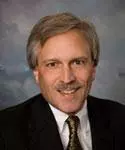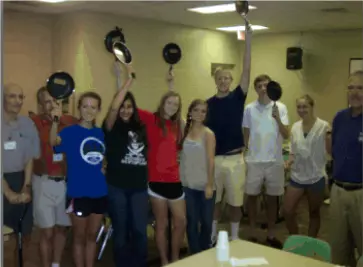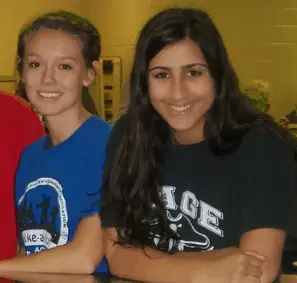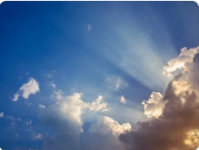Todd tells the story of his daughter, Morgan, and her friend, Jenna, helping out at a homeless shelter - and what they learned from that experience.


I co-lead a group of volunteers who gather early every Friday morning at Greensboro Urban Ministry (GUM) to prepare and serve breakfast to 100 or more homeless men and women. Before breakfast is served, we share a brief devotion and prayer with our guests.
I usually arrange the devotion leader, and getting someone to do this can be hard – after all, surveys show peoples' top fear is public speaking. While I always ask our pastors to lead devotions once a quarter, my preference is to get non-clergy. Why? Because their stories are more authentic and heartfelt. Our volunteers and guests can more easily connect with the speaker's story. We've heard Charlotte talk about her backwoods camping and experiencing "thin places." We've had Ken share a wonderful poem which had touched his heart. We've been moved as Ginny shared her experience of her mother's death just the week before.
But the most memorable devotion of all? That was shared on July 19, 2013. Let me set the stage.
On April 7, 2006, First Lutheran Church launched its Friday Breakfast Community at GUM. A month or so after it launched, my daughter Morgan – then a seventh-grader, and without prodding from me – said on a Thursday evening, "Daddy, wake me up at 4:30 tomorrow morning – I want to serve with you." So I did, and she got ready. We rode together to GUM, and we made PB&J sandwiches and bag lunches together. Afterwards, we had breakfast at Chick-fil-a and then I dropped her off at middle school.
We did this again the following Friday, and over that second breakfast, Morgan asked, "Daddy, would it be okay if I brought a friend next week?" I said, "Sure, Sweetie – invite whoever you want, and we'll include them." Who received that first invitation? Her BFF since second grade, Jenna Sawafta. The next Friday, we picked up Jenna, all three of us made PB&J sandwiches and bag lunches, and I took them to Chick-fil-a, then dropped them off at school.
Both girls continued serving regularly with the group throughout middle school and high school, always inviting others to come with them, many of whom also became regular volunteers. Saying our formal "good bye and good luck" to these wonderful kids on June 1, 2012 – shortly before their high school graduation – was one of the hardest things our group ever had to do.

Just over a year later, in mid-July 2013, I was wondering who would lead devotions on Friday. Imagine my surprise at this text message chain just a few moments later:
- Morgan – Daddy, do you have anyone lined up for devotions yet for this Friday?
- Todd – No, why?
- Morgan – Because Jenna would like to lead devotions.
- Todd – Wow, that would be great! Looking forward to seeing and hearing her!
Friday came. Jenna and Morgan were there, along with many of their friends. Then Jenna shared these words, her voice filled with strength and love:
|
For those of you who did not know, I am a Muslim and right now we are celebrating the holy month of Ramadan. Ramadan is a month where Muslims fast everyday from sunrise to sunset, and this month gets two weeks earlier every year. As many can imagine, fasting in the winter is much easier because the sunset is much earlier, typically around 5:00 or 6:00, and summer is the hardest time to fast because of late sunsets, around 8:00 and 9:00, accompanied by the heat. However, no matter what month it is, fasting is very difficult. When fasting, Muslims abstain from not only food but also drink, including water. The point of these restrictions is to separate human beings from their earthly desires and strip them down to a vulnerable state, where they are left with not much more than faith to keep them going. Ramadan is a time when, through fasting and reflection and self-control, you have the chance to be your best self, and to make the world a little better place. When explaining to non-Muslims the practice of fasting from sunrise to sunset, I often get looks of shock and statements like "Why on earth would you put yourself through that?" "How do you survive?" "What is the point of that suffering?" The truth is that, when I began fasting the month of Ramadan, I was in third grade and had many of these same thoughts. I fasted because it was something I knew I should do, but I didn't understand why. And I certainly didn't abstain from complaining about it! Ironically, it wasn't until seventh grade, when I started volunteering with First Lutheran Churchat Greensboro Urban Ministry, that I truly understood the purpose. Trust me when I say no one was more surprised than me that, through delving into the world of Christianity, I would become a stronger Muslim. When I first began volunteering, doing things as simple as making PB&J sandwiches and serving food and drinks, I began to see how the simplest of good deeds could make a difference. I saw this through the people who looked me in the eye with the most sincere looks I have ever seen, thanking me for what I was doing, as if making a sandwich was changing the world. But then it dawned upon me – when I am fasting and I have gone the whole day without any food or water, and I hit the point when I have two hours to go and my head is pounding and I am so exhausted and weak that I can't function, I realize how dependent I am on God. I realize these so-called "simple things" – food and water – make all the difference. That without these basic things God has provided, I have nothing. |

|
And that is when I understood the role PB&J sandwiches and a hot breakfast played in changing the world. Even more than that, I realized I am not invincible. Often, we get so caught up in our lives and dramas, we put God and faith on a back-burner, thinking we are strong enough to survive without it or that we will always have tomorrow. But the truth is, you never know what the future holds. My best friends Morgan and Joann have also fasted with me a few times – these were great experiences that allowed us to not only learn more about each other, but grow as friends. Ramadan is also a time of reflection, a time to take stock and be thankful. I am very thankful for the Hermans bringing me along in seventh grade, for growing as a person during my seven years of volunteering, and – best of all – for realizing through listening to your teachings and prayers that, although we don't share the same faith, we are far more similar than we are different. Thank you for everything you all have taught me! I hope that in sharing my thoughts with you today, in some small way, I have returned that favor. |
Jenna, thank you for sharing a heartfelt devotion – and, yes, you have MORE than returned that favor!
In his wonderful book, Jesus For the Rest of Us, former pastor John Selby comments:
Jesus seems to have said very little about what we should avoid doing in life. In fact, throughout the four Gospels, there are only two dramatic statements he's quoted as saying, loud and clear, that carry a negative intonation. They also happen to be the most insightful commandments ever to ring in human ears. They stand as our primary psychological challenge if we're to walk the path Jesus walked. (page 91)
What are these two statements? Judge not, fear not. Judgement is backward-looking – an action or outcome can only be judged in hindsight. Fearfulness is forward-looking – the outcomes of an action, or an inaction, are not known and thus potentially bad.
These days, many Christians seem to have forgotten Jesus' commands to judge not and fear not. Judging actions committed by terrorists have been wrongly conflated into judging Muslims and refugees. Fearing possible future actions by terrorists have been wrongly turned into fearing Muslims and refugees. We forget the baby Jesus was himself a refugee, and the adult Jesus was perceived by many as a threat.
Living the Christmas StoryHave you ever read the Christmas stories in the Bible and pay close attention? Ever notice the details of the people involved and the shocking insights they reveal about God?
Nearly every character in the story has been labeled, judged, and excluded due to fear, bias, and stereotypes. Most, if not all, would have been turned away based on the social rules and religious doctrines of the day. Most, if not all, would have been feared and judged as unworthy of God's attention and love. Yet, all the while, angels (portraying the voice of God) tell them constantly, "Don't be afraid. God is up to something amazing, and YOU get to be part of it all!" Every one of these feared, judged, and excluded outsiders knew – and felt – the power of the label they bore. But God saw the judgmental human labels as a special qualification for God's work. God needed and used these people to birth God's dream of wholeness and well-being for the entire world. These social and religious losers were first round draft picks on God's team of setting things right! And what happens?
To me, all these characters personify a new hope and vision religion can offer the world – if religious people and institutions choose to evolve rather than self-destruct. This would require people and institutions to:
Jenna and Morgan symbolize what religion and our world could be. It's an honor to be a small part of their story. It offers Muslims, Jews, and Christians – and all religions – a way to become God's blessing for the world ... if we choose to do so. Blessings,
|
After the scholars were gone,
God's angel showed up again in Joseph's dream and commanded,
"Get up. Take the child and his mother and flee to Egypt. Stay until further notice. Herod is on the hunt for this child, and wants to kill him."
(Matthew 2:13, The Message)
For the Christian, the question is – Can you walk Jesus' path, and avoid judging and fearing? For all people of good will, the question is – What is the just and compassionate thing to do?
Jenna and Morgan remind us to not judge others whose faiths and backgrounds differ from our own. Morgan is fearless in calling out those who use their power, wealth, or status to demean, cheat, or hurt others – as several bigots and bullies have learned the hard way. Jenna – who is never at a loss for words! – overcame any fear she had of sharing her faith story with us.
Even as little girls, and now as adult women, Morgan and Jenna have much to teach us. They teach us about being your best self and making the world a little better place. They teach us about not judging and not fearing.
Judge not, fear not. Jesus commanded it. Morgan and Jenna do it. Can we?
Peace, Shalom, Salaam, Namaste,
![]()
Todd L. Herman
PS – Like all good stories, this story did not end on July 19, 2013. So, just like the storyteller Scheherazade in the Arabian Nights, I will save that story for another time.
PPS – This year, Christmas is on a Friday. Even so, my friends and I will show up at GUMearly that morning to prepare and serve breakfast, just as we always do. I invite you to come and serve with us.






